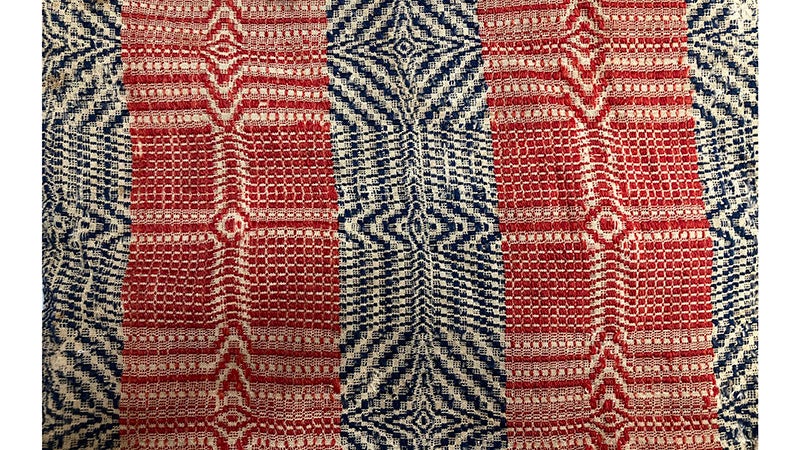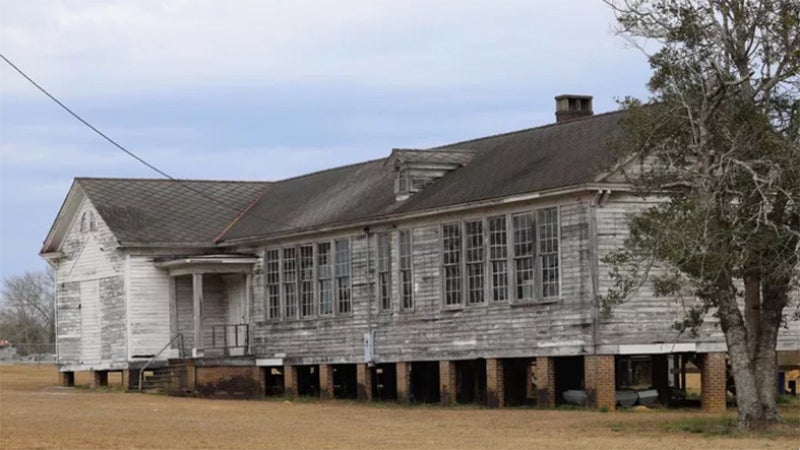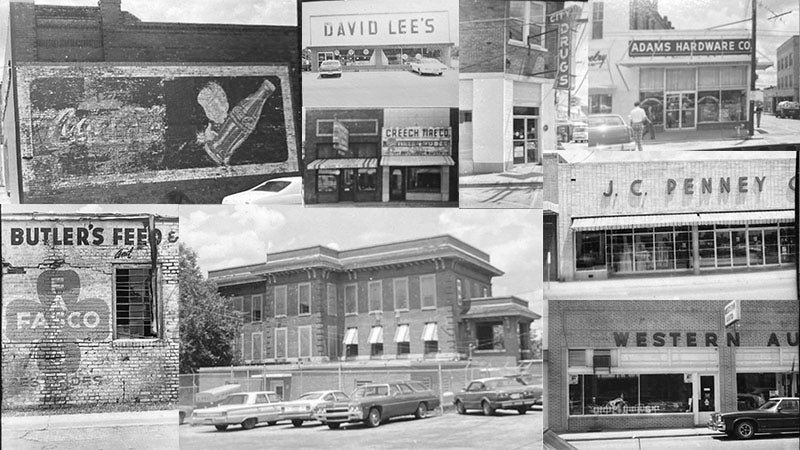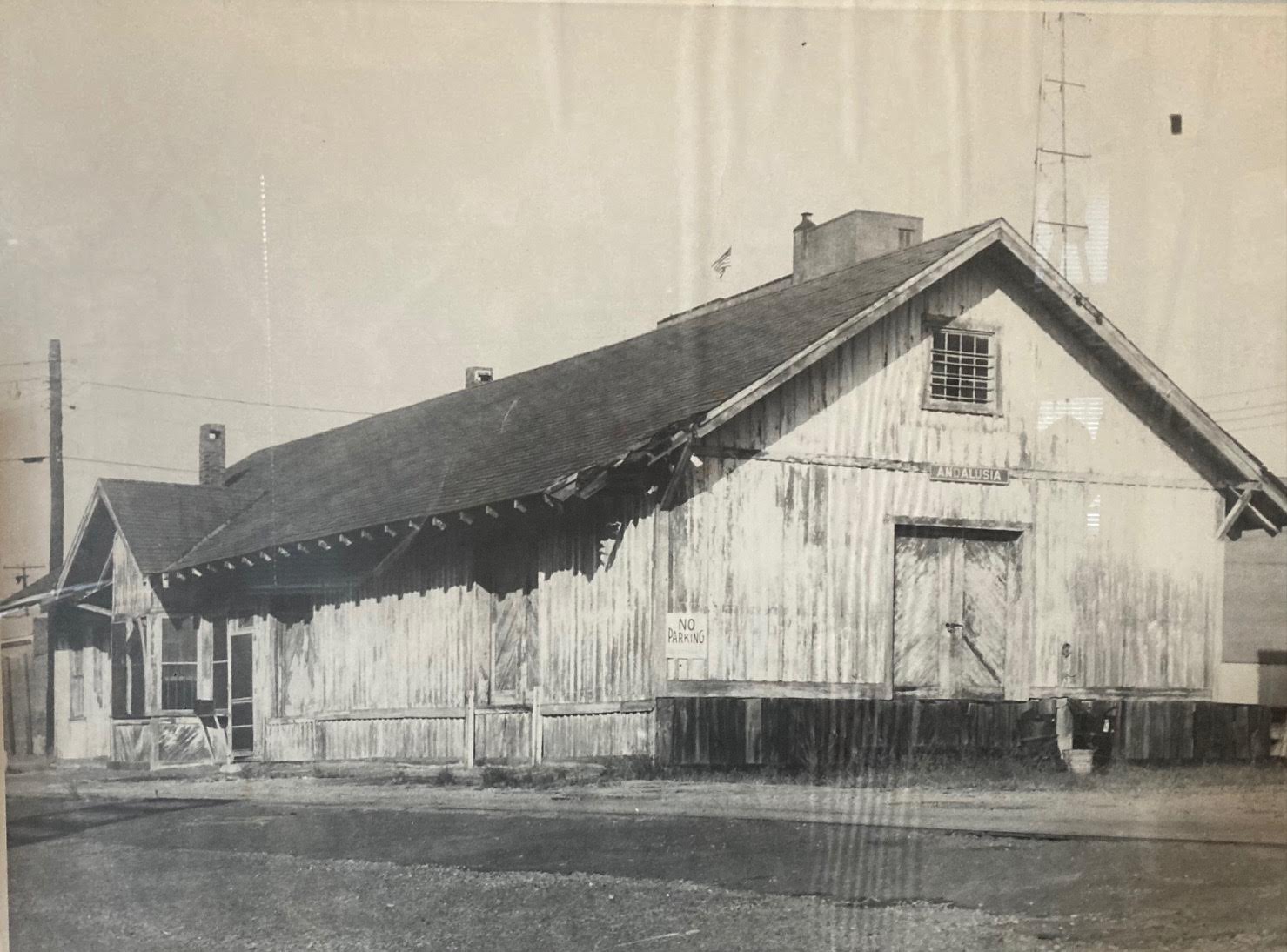Remember When: Pleasant Home’s General Underwood was LBJ’s pilot
Published 2:28 am Saturday, February 23, 2019
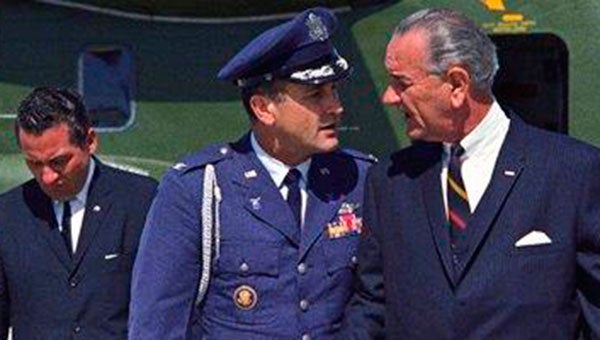
- General Underwood Cross with President Lyndon B. Johnson.
“Generations yet to come will be enriched by his worthy story,” Luci Baines Johnson wrote about James Underwood Cross who never forgot his roots in rural Alabama and grew up to serve the most powerful man in the world at the time, President Lyndon Johnson.
This is another story from the displays at the Three Notch Museum in Andalusia, Alabama, a true story about a Covington County boy from the Pleasant Home community who attained much success in his profession. To see the eyes of the local students, visitors to the museum, who stare in amazement and wonder when hearing about one of our own who rose to greatness is worth all the effort in establishing a local history museum in a small town. Maybe the young boys and girls are silently pondering their goals in life, “Will an opportunity like this ever come my way?”
A good portion of this story comes from information in the book written by the late Brigadier General James U. Cross, USAF Retired, who wrote and published his book of memoirs, “Around the World with LBJ, My Wild Ride as Air Force One Pilot, White House Aide, and Personal Confidant.” The internet is my other source as well as the remembrances of local citizens who visit Three Notch Museum and discover the miniature plane of USAF One and scrapbook pictures that Cross donated for the exhibit.
Underwood Cross was born April 25, 1925 in rural Covington County to James Kension Cross and Susie Jesse Wells Cross. They lived in the headquarters camp, a company owned dwelling made from a converted wooden railroad boxcar. A small gathering of wooden buildings and converted boxcars served as local headquarters for the large wood products firm known as the Horse Shoe Lumber Company at River Falls.
His father was employed to run a pumping station supplying water from a nearby creek to the steam locomotives used to haul harvested timber to sawmills and lumber markets.
After the flood of 1929 and the beginning of the Depression, the Horse Shoe Lumber Company disappeared from the scene, and the family found it necessary to move back near the grandparents’ farm in Pleasant Home.
Even though Cross’ father and mother moved around from place to place in the South doing construction work, Cross being the oldest of seven children stayed mostly with his grandmother on the farm to help with work to be done – harvesting, peeling, canning, preserving fruits and vegetables in the summer; killing hogs around Christmas time; feeding the hogs, chickens, and mules; milking the cows; and bringing in wood for the cook stove and fireplaces before walking to Pleasant Home School about a mile and half away.
Cross stated, “The only gathering places for social activity were the school, the Pleasant Home Baptist Church, and Catoe’s Country Store. Andalusia was 13 miles away and every two or three months, we made the grueling trip to town for essential clothing, shoes, animal feed, and other supplies. We would hitch the mule Swimjenny to a wagon, begin our tortuous journey beginning at daybreak usually on a Saturday returning by nightfall. The road was not paved until 1933 so the sticky red clay was nearly impassable after heavy rains.”
“Our lifestyle was primitive by today’s standards. It was a time of taking cool summer showers beneath a 50-gallon barrel of a 7-foot platform and visiting a 2-hole outhouse equipped with a back issue of a Sears and Roebuck catalog. I still fondly recall swimming in the creeks, hunting, fishing, and roaming the piney woods.”
“Army recruiters showed up in 1943 when I was a senior at PHS, but I was more than ready to leave the nest. Three days after graduation, my induction notice came in the mail, and I reported for duty on June 24, 1943. I was an eager recruit especially when they talked about pilot training and confident that I would be blasting enemy planes out of the sky over Europe or the Pacific!”
Cross started into flight training school in California and later in West Texas where he finally got his pilot wings. He was assigned to temporary duty in Missouri and then to Austin, Texas where he met a beautiful blonde teenage girl Marie Campbell who stole his heart. They were married in July 1945.
After flight training, his flight crew was assigned to fly the “Hump” over the Himalayas in the China/Burma theater, a highly dangerous air route over the tallest mountains in the world and with deadly weather conditions.
“Those eight months were the most valuable flying experience one could have ever endured,” Cross remembered.
Discharged from active duty in February 1946, Cross was assigned to the Army Air Corps Reserves at which time he enrolled as a full-time student at Auburn University. He was recalled to duty in October 1948 by the Army Air Corps now re-designated the new U. S. Air Force.
After numerous assignments, his big break came when he applied to the 1254th Air Transport Group, the Special Air Missions unit whose job was to provide air transportation to the president, the vice president, and other high ranking government officials. He had 6,000 hours of flying time and good character ratings so he got the assignment.
An owner of a small country store that he frequented near their house adjacent to Dover Air Base heard about his selection to the elite unit. The man who wore overalls and sat by a pot-bellied stove declared, “One of these days, I’ll see the president’s airplane go over and I’ll know you’re flying it!”
“Little did I realize at the time how prophetic that country storekeeper had been,” Cross said.
After flying Secretary of State John Foster Dulles, Vice President Richard Nixon, President Dwight D. Eisenhower, Senator Barry Goldwater, and in early 1961 Vice President Lyndon Johnson who called Major Cross a “can-do” man, Johnson chose Cross to be his regular pilot.
In November 1963 after the assassination of President John F. Kennedy, President Johnson requested that Cross become qualified to fly a Boeing 707, the main presidential aircraft. By May 1964, Cross became the co-pilot of Air Force One as well as Armed Forces Aide in the White House. He worked both full-time jobs from 1965 to 1968 changing from Air Force uniform to White House business suit as the occasion warranted.
In 1965, Cross was promoted by President Johnson to chief Air Force One pilot. Cross was part of the Johnson family and Johnson’s confidant during his administration. Cross described the president as the “ultimate back seat pilot.” They went whenever and wherever Johnson wanted to go. Protocol, rules, and red tape couldn’t stop them. Johnson was also described by Cross as the “best co-pilot in adventure anyone could ever have had.”
Johnson became the first president to circumnavigate the globe. The itinerary was impromptu without a definite plan. That journey Cross shared with President Johnson made history – an around-the-world trip in four and a half days over 26,959 miles right before Christmas where they landed in seven countries and territories including a stop to visit U. S. troops in Vietnam and another stop to meet with Pope Paul VI at the Vatican. A separate plane for the press followed the presidential entourage right along.
Cross’ last official duty for President Johnson was very personal and somber. When former President Johnson died of a heart attack on January 22, 1973, official protocol called for an active duty military officer to serve as an escort for Mrs. Johnson to all funeral services and programs. Mrs. Johnson called on their most trusted friend, the then-retired Cross, to be her escort at the LBJ Presidential Library, the U. S. Capitol, the funeral church in Washington, D. C., and at the burial at the LBJ Ranch in Stonewall, Texas. He was Lady Bird’s pillar of strength when Johnson was laid to rest.
“Today as I recall those eleven exciting and eventful years from late 1961 until the president’s death in 1973, I am first reminded of Mr. Johnson’s vast energy and determination to pull the nation from the depths of despair after the JFK assassination,” Cross penned in his book.
“He lived only four years and a few days after leaving office. I witnessed him ill and tired, but also happy as he made a peaceful transition back to his lifelong love, the life of a gentleman rancher.”
A few days after Johnson’s funeral, Mrs. Johnson knowing Cross was running a small cattle ranch of his own presented him with one of her husband’s prized Hereford bulls. Like the entire Johnson herd, it was branded on its horns with the president’s initials. Their three children promptly named him LBJ. “That unexpected gift meant the world to me, and it kept the Johnson legacy alive on my ranch and in my own family,” Cross wrote.
It was pretty widely known and talked about in Washington when so many pilots applied for the job Cross got when Johnson hand-picked him as his pilot that Johnson who was basically a country boy really liked Cross above all the other applicants, because he, too, was a country boy!
Johnson put Cross in charge of so much – supervising the President’s transportation fleet, managing the President’s emergency spending fund, supervising Camp David, hiring White House social aides, responding to letters from servicemen in Vietnam, writing condolence letters to the families of soldiers who died in that war, and even helping the President with his wardrobe.
Brigadier General James Underwood Cross of Gatesville, Texas died July 11, 2015 at the age of 90 years old and was buried in the Pleasant Home Baptist Church Cemetery near Andalusia beside his wife who died in 2010. He shared many memories in his 2008 book which I hope the readers of this column will read in its entirety and REMEMBER WHEN this young person grew up right here in this county and went on to make us all so proud of him and his accomplishments. If nothing else, this engrossing story will hopefully encourage some young readers to follow their dream when they will learn about when Cross, a small town boy, went “all the way with LBJ.”
Sue Bass Wilson, AHS Class of 1965, is a local real estate broker and long-time member of the Covington Historical Society. She can be reached at suebwilson47@gmail.com.



